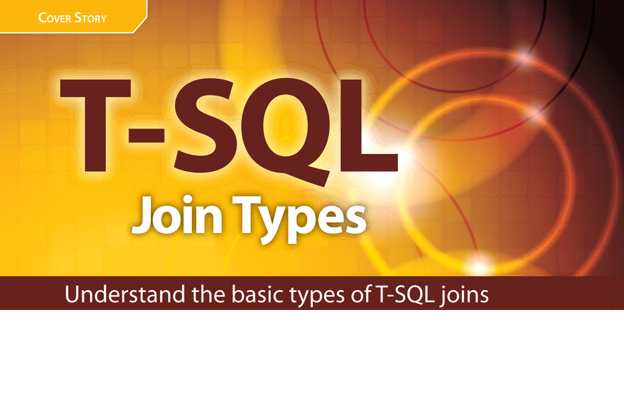| T-SQL Join Types In SQL Server Pro's June Issue |
| Written by Ian Stirk |
| Monday, 10 June 2013 |
|
Now you have no excuse not to know about the common T-SQL join types! The June issue of the online subscription magazine provides a comprehensive introduction to the commonly used join types. While the article is aimed at the beginner, it can also serve as a refresher for experienced SQL developers. It is easy to read, and provides some great examples of how and when to use the different join types. Simple Venn diagrams are used to illustrate the join types, together with the inclusion of sample data from two tables.
The join types discussed are:
The editorial discusses The SQL Server Community, and continues the recent editorial relating to advancing your SQL skills via the community. Further useful resources are supplied, including seminars from Kalen Delaney, PASS, and SSWUG. Additionally, there are details of a very unusual SQL Cruise course, where you can take a one week cruise and learn about SQL Server – it’s a novel idea, I wonder if it will catch on… In an insightful article, Itzik Ben-Gan discusses Unwanted T-SQL Expression Failure. Sometimes you don’t want your SQL expressions to fail catastrophically, returning a NULL instead might be a better alternative. Various examples of such failures are given (e.g. divide by zero, arithmetic overflow) together with a future possible solution i.e. a proposed new keyword TRY_EXPRESSION. If you need to provide estimates of future values e.g. sales forecasts, you should investigate the forecasting capabilities included in SQL Server Analysis Services (SSAS). Tyler Chessman provides such an introduction via Understanding Time Series Forecasting Concepts. The basic premise being: Forecast value = base + trend + seasonal factor. It’s a detailed discussion, perhaps a little academic in parts, but a great backgrounder, with some useful next steps.
Michael Otey briefly reviews 4 Essential PowerShell Cmdlets for SQL Server. PowerShell is increasingly being used to manage SQL Server, so it’s certainly a skill worth mastering. The cmdlets discussed include a navigation component (with useful DOS like commands), running T-SQL via a cmdlet (ideal for cross-server admin tasks), and getting help (this is particularly useful for beginners). The lead article in this month’s magazine was outstanding, some of the other features are also worth reading. However, there was no Question and Answer feature this month, additionally there was a lack of incidental articles – both of these often provide a snippet of information that can payback 10-fold, so overall this month’s magazine was a bit disappointing.
More InformationRelated ArticlesInside SQL Server Pro Magazine May 2013 AlwaysOn Availability in SQL Server Pro Magazine SQL Server In The Era Of Big Data Improve Performance with SQL Server Pro Magazine February 2013 SQL Server Pro Magazine January 2013 Inside SQL Server Pro December 2012
To be informed about new articles on I Programmer, install the I Programmer Toolbar, subscribe to the RSS feed, follow us on, Twitter, Facebook, Google+ or Linkedin, or sign up for our weekly newsletter.
Comments
or email your comment to: comments@i-programmer.info
|
| Last Updated ( Monday, 10 June 2013 ) |




